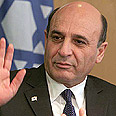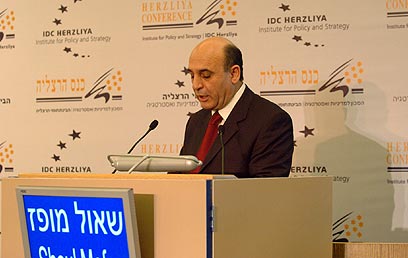
Mofaz: We won't accept Iran's threat
Speaking at Herzliya Conference Saturday Defense minister says if Israel fails to find suitable Palestinian partner, it may unilaterally establish its borders. Terror, Iran's nuclear armament efforts greatest threats to Israel's security, Mofaz says
Defense Minister Shaul Mofaz stated Saturday that the future of the Road Map peace plan depended on Israel's partner.
"If we find a legitimate and effective partner, we should move forward according to the Road Map peace plan, while understanding there are stages on the way to a permanent agreement. However, if it turns out there is no partner, Israel needs to take its destiny into its own hands," Mofaz said.
Speaking at the sixth annual Herzliya Conference on the Balance of Israel’s National Security, which opened Saturday evening, Mofaz stressed that if no partner is found, Israel needs to "establish defensible borders, strengthen settlement blocs, keep Jerusalem undivided, including its surrounding area, and demilitarize the Palestinian territory."
"We must do this with American and international backing. I believe such a plan will win wide national support," he said.
The Iranian menace
Mofaz chose to begin his speech with a scathing assault on Iran and its leader, President Mahmoud Ahmadinejad.
Mofaz referred to the meeting held between Ahmadinejad and Syrian President Bashar Assad last week as "the summit of terror," and called the two leaders "representatives of the past."
Iran is not only a menace to Israel, but to the entire world, Mofaz stated.
According to Mofaz, "money is the fuel for terror. The financial assistance Iran transfers to Hizbullah totals some 100 million dollars each year. Some of these funds are funneled from Hizbullah to Palestinian terror groups.
In addition, Iran is the main sponsor of the Islamic Jihad, which carried out most suicide attacks in Israel last year, including the attack in Tel Aviv's central bus station."
The defense minister estimated that Islamic Jihad cells in the West Bank received about 10 million dollars from Hizbullah in 2005, compared to just 5 million dollars in 2004.
'A year of struggle'
"I believe everyone present here understand the extent to which the combination of am extremist regime with long-range ballistic capability, ongoing efforts to obtain nuclear weapons and support in terror constitutes a danger not only to Israel, but to the entire world," Mofaz stated.
However, the defense minister said Israel was preparing response options against the Iranian nuclear project.
"The state of Israel will not be able to accept Iranian armament, and must prepare to defend itself. Iran's president's regime supports terror in the Middle East by providing terror organizations with rockets that threaten Israel, money and knowledge."

Defense Minister Mofaz. 'Money fuels terror' (Photo: Ori Porat)
Mofaz said that the year to come, 2006, is set to be "a year of struggle."
"While Israel's strategic state is much better today in terms of our international standing and the relations with the United States, the country faces some imminent threats such as Iran's nuclear armament and the strengthening of terror. This is why 2006 will be a year of struggle, not a year of resolutions," Mofaz said.
"In the coming years we need to boost the strategic coordination with the U.S. and Europe, as well as with the peaceful countries Egypt and Jordan. Jihad draws near to us, and so we must combine efforts with the countries of the West," the defense minister explained.
Commenting on Syria's President Assad, Mofaz said the leader "has made every possible mistake," in his support of terror.
Mofaz has also remarked on the positive aspects in Israel's "strategic balance":
"Syria is under international pressure, while we have peace agreements with Arab states and the reality does not allow for the formation of an Arab coalition against Israel. The strength of the peace agreements with Jordan and Egypt contributes to stability in the region, which is why they must continue to be nurtured," Mofaz concluded.
Eiland: 'Worse situation than ion 1967'
National Security Council Director, Major General (res.) Giora Eiland, who spoke prior to Mofaz, also gave an analysis of Israel's current strategic situation, and said Israel is in a worse state now than it was in 1967, before the Six Day War, due to the fact the country is now forced to support the Palestinian entity.
In his speech Eiland said that "Israel's erroneous message throughout the years has been 'leave the Palestinian problem to us, it's ours to handle.'"
Eiland further stated that the regional issue is now the concern of the international community as a whole.
"The high cost to the world, the growth in global terror, three million Palestinians under occupation, the lack of development in democracy in the Arab states – all these lead the world's countries to demand an end to the Israel-Palestinian conflict," Eiland explained.
"Israel seeks a solution to its security problems first, while the Palestinians want a stabilization of their political system before making any progress," Eiland said.
A demographical problem looming
Eiland also stated that by the year 2050 there will be 30 million people living between the river of Jordan and the Mediterranean Sea.
"As we have conveyed to the world for the last 38 years, this remains our problem. This issue raises very problematic questions regarding the distribution of resources in this territory – from the distribution of air and water to that of land," he added.
Referring to the issue of Syria and Lebanon, Eiland said old conceptions regarding the subject need to change.
"The widespread attitudes towards these countries need to change. It's illogical to keep perceiving Syria and Lebanon as one and the same. Now days Syria and Lebanon have a different rational," Eiland explained.
"In Lebanon there is one organization that effects our border situation, and that is Hizbullah, which is influenced by both Syria and Iran," he added.










